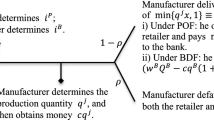Abstract
The trade credit is an important way of the enterprise’s short-term financing and used wildly. Because of the uncertain market demand, both the retailer and the supplier have the risk of losses. So, they must do the appropriate choose between trade on credit and trade on cash. In this paper, the trade credit will of both sides is studied from the angle of retailer’s own funds. The result explains the trade credit threshold in practice. The retailer with any own funds would like to choose trade credit, but the supplier only provides trade credit on certain condition. In the last, some management advices are given to the retailer and the supplier according the analysis, and numerical examples are given to make the theory analysis be visually.
Access this chapter
Tax calculation will be finalised at checkout
Purchases are for personal use only
Similar content being viewed by others
References
Aggarwal SP, Jaggi CK (1995) Ordering policies of deteriorating items under permissible delay in payments. J Oper Res Soc 46(5):658–662
Arkan A, Hejazi SR (2012) Coordinating orders in a two echelon supply chain with controllable lead time and ordering cost using the credit period. Comput Ind Eng 62(1):56–69
Chen X, Wan G (2011) The effect of financing on a budget-constrained supply chain under wholesale price contract. Asia-Pacific J Oper Res 28(4):457–485
Cheng H, Wang X (2009) An analysis on credit sale ratio in a supply chin. J Bus Econ 218(12):22–27
Cheng H, Wang X, Su Y (2011) Optimal trade credit policy for supplier under asymmetric information in the supply chain. J Donghua Univ 28(4):10–14
Fafchamps M (1997) Trade credit in Zimbabwean manufacturing. World Dev 25(5):795–815
Fisman R, Love I (2003) Trade credit, financial intermediary development, and industry growth. J Financ 58(1):353–374
Goyal SK (1985) Economic order quantity under conditions of permissible delay in payments. J Oper Res Soc 335–338
Group C et al (2007) Supply chain finance: a new way for trade banks to strengthen customer relationship. White paper
Haley CW, Higgins RC (1973) Inventory policy and trade credit financing. Manag Sci 20(4-Part-I):464–471
Huang H, Shi X, Zhang S (2011) Counter-cyclical substitution between trade credit and bank credit. J Banking Finan 35(8):1859–1878
Lai G, Debo LG, Sycara K (2009) Sharing inventory risk in supply chain: the implication of financial constraint. Omega 37(4):811–825
Lee CH, Rhee BD (2011) Trade credit for supply chain coordination. Eur J Oper Res 214(1):136–146
Li K, Zhang YD, Yan JY (2012) Supply chain coordination under uniformly distributed market demand. Chin J Manag Sci 20(3):131–137
Liu T (2009) Inspiration and coordination and strategy analysis in supply chain under trade credit. Nan**g University of Aeronautics and Astronautics, Nan**g
Luo W, Shang K (2013) Managing inventory for entrepreneurial firms with trade credit and payment defaults. Available at SSRN
Ma Z, Chen X, Zhu D (2009) The influence of short-term loan and trade credit enterprise operation. Syst Eng 11:39–45
Perakis G, Guillaume R (2008) Regret in the newsvendor model with partial information. Oper Res 56(1):188–203
Ren JB, Chen QW (2009) Supply chain coordination with retailer trade credit. Ind Eng Manag 14(2):10–14
Sheen GJ, Tsao YC (2007) Channel coordination, trade credit and quantity discounts for freight cost. Transp Res Part E Logistics Transp Rev 43(2):112–128
Shinn SW, Hwang H, Sung SP (1996) Joint price and lot size determination under conditions of permissible delay in payments and quantity discounts for freight cost. Eur J Oper Res 91(3):528–542
Teng JT, Lou KR, Wang L (2013) Optimal trade credit and lot size policies in economic production quantity models with learning curve production costs. Int J Prod Econ. http://dx.doi.org/10.1016/j.ijpe.2013.10.012
Tsao YC (2010) Managing multi-echelon multi-item channels with trade allowances under credit period. Int J Prod Econ 127(2):226–237
Wu W, Firth M, Rui OM (2014) Trust and the provision of trade credit. J Banking Finan 39:146–159
Zhang Q, Luo J (2009) Coordination of supply chain with trade credit under bilateral information asymmetry. Syst Eng-Theor Pract 29(9):32–40
Acknowledgments
The paper is supported by the National Natural Science Foundation China (Grant No. 71071103), the Ministry of Education, Humanities and Social Science Planning Fund for the Western and Frontier (Grant No. 13XJC630014) and the Central Universities Basic Research Funds Special Projects of Sichuan University (Grant No. SKQ201119). We thank the anonymous reviewer for their helpful comments.
Author information
Authors and Affiliations
Corresponding author
Rights and permissions
Copyright information
© 2014 Springer-Verlag Berlin Heidelberg
About this paper
Cite this paper
Cheng, H., Guo, H., Wang, X. (2014). The Trade Credit Will in Supply Chain Transactions. In: Xu, J., Cruz-Machado, V., Lev, B., Nickel, S. (eds) Proceedings of the Eighth International Conference on Management Science and Engineering Management. Advances in Intelligent Systems and Computing, vol 280. Springer, Berlin, Heidelberg. https://doi.org/10.1007/978-3-642-55182-6_60
Download citation
DOI: https://doi.org/10.1007/978-3-642-55182-6_60
Published:
Publisher Name: Springer, Berlin, Heidelberg
Print ISBN: 978-3-642-55181-9
Online ISBN: 978-3-642-55182-6
eBook Packages: EngineeringEngineering (R0)




